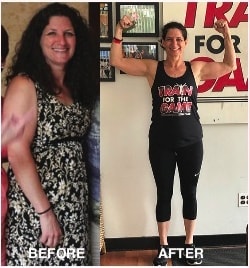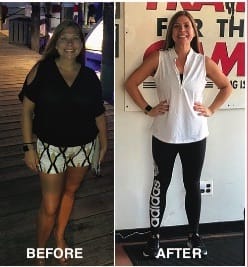The holiday season is here! Whether we’ve prepared or not, it always seems to come with its course of chaos and stress.
Contrary to many popular beliefs, the average American doesn’t gain much weight during this festive time frame. In fact, a study by The New England Journal of Medicine found that the average American only gains about a pound from Thanksgiving to Christmas.
Not too much to fret about, right? This leads to us wondering why our health and holidays always seem to be the misery of our waistline before the inaugural push to ditch the weight gain come January.
While the food and time traveling and cooking make weight loss harder, the deeper rooted problem many faces is the emotional battle with their health during this time.
Think about it. While we may fall victim to many temptations, another overlooked aspect is the lack of time to work out and the emotional stress of family trips and gatherings.
Health is more than just a number on a scale, it’s also a state of mind.
Holiday Stress
Stress plays a pivotal role in our body and overall well-being. While training and intense exercise can cause stress in central and peripheral nervous system fatigue, adrenal fatigue can impact our lifestyle.
This is why some of you have that feeling of being “hit by a truck” after a long work week. Too much stress in the body can create spikes in cortisol. When you’re under stress, your body releases a flood of cortisol, also known as the “stress hormone.” This additional stress can then lead to an increased appetite from the spike of the hormone ghrelin. This dangerous combination can be what causes the excess weight to creep on during the holiday season.
While we all strive to embrace the “most wonderful time” of the year, we should all take some preventive measures to keep ourselves emotionally strong to have us prepared and positioned for success come the New Year.
Prioritize Movement FIRST in your day
This is crucial. As you begin attending parties, shopping sprees, and visiting family, you need to make sure you get your exercise done first thing in the morning. While generally it’s recommended to train during a time when it best suits your lifestyle, this time of year makes that belief hard to abide by. Many of us who try to train later end up getting caught up in outside stresses that are out of our control (think long shopping trips, traffic, family crises). These always happen and will inevitably take precedence over your training. The best way to combat this would be to plan your exercise when you first wake up! A healthy body will be a happy body, and studies have shown that those who exercise can better cope and handle stress.
If you cannot get yourself to exercise first thing, another great option is to go for a gratitude walk. Go for a walk first thing in the morning phone-free and focus on thinking about everything you are grateful for. Not only can this help get additional movement, but it will also give you a strong mental reset of being thankful for everything that truly matters in your life and not the stresses.
Don’t Sweat The Diet
If you count calories and are very meticulous about your nutrition, this one is for you. The struggle to eat healthy over the holiday season is nothing new. In fact, being a gym owner has had me see the dark sides of many members losing sight in just a few short weeks. Surprisingly, the issue isn’t always about the weight gain, but rather the mental stress the holidays bring to them with planning, meal prep, and figuring out how to manage their caloric intake.
This mental stress is what looms over most people more than anything. How many times have you been to parties or even locked yourself at home baking all day only to have your cookie fix satisfied?
Ten minutes later you’ve eaten half the batch. The guilt you feel afterward is what we all need to focus on easing up with. The holidays are going to be hard to stay on track and holding yourself to high nutrition standards might not be the best idea for those struggling with a lot of additional stress.
Learning to be easy on yourself and realize that one overindulging meal or plate of cookies will not define you or hurt you, but consistently beating yourself up for failing to perfectly adhere to a diet plan can!
If you are someone that likes to have a plan, try being the person who makes a healthy dish to bring to the party, so you know you have an option to stick with when you are there. Additionally, a simple fix is to have a protein shake before you go. This will help curb hunger and give you added protein to your diet, which always seems to be lacking during the holiday season.
Get Your Rest and Nutrients
While eating perfectly is tough to do during this time, getting your rest and quality nutrients is not!
Many of us tend to get the “winter blues” with the loss of light and the ability to be outside as much. A simple way to fix this is to make sure you cover your basis with all the proper nutrients that aid in energy and mood.
Foods that help with mood, anxiety, and depression are fatty fish, dark chocolate, fermented foods like yogurt, bananas, oats, beans, and nuts/seeds.
Aside from the foods you eat, the rest you get will directly correlate with how you feel emotionally. It’s estimated that 20% of the world’s population is sleep-deprived. Lack of sleep wreaks absolute havoc on every bodily system, and impacts everything from your relationships to your concentration and cognitive capacity.
Sleep
Sleep truly is the biggest recovery tool readily available. The holiday season is a good time to focus on getting enough rest. Lack of sleep causes central fatigue, which means that fewer high threshold motor units can be recruited, which means fewer muscle fibers will be activated to be stimulated to grow when attempting to build muscle.
When it comes to your cardiovascular work, a single night of sleep restriction following heavy exercise had marked consequences on performance the next morning. So either way you look at it, athletes need sleep to both perform and cognitively function.
Recent research found that just one week of sleeping for 5 hours per night decreases testosterone by 10-15 percent compared to sleeping for a full 7-8 hours. When your sleep is limited for weeks or months on end, the decrease in testosterone production becomes even greater, which can lead to major performance flaws when athletes come back to training after the holiday season. Also stemming back to cortisol, the lack of sleep will spike cortisol levels, making your holiday season much more stressful than it should be.
Recommended sleep habits are going to bed at the same time every night, turning off electronics an hour before bed, and sleeping in a cool environment.
While the holiday season is notoriously known for missed workouts, over-indulging, and taking time “off,” it also needs to be noted that it is okay to have some downtime to spend time with loved ones!
Without mental and physical breaks from exercise, our body’s ability to perform at high levels diminishes with fatigue.
Try to focus on moving every morning, minimizing stress, and getting rest. You will enter your training season in a perfect state of mind to be able to crush your goals in the new year!


